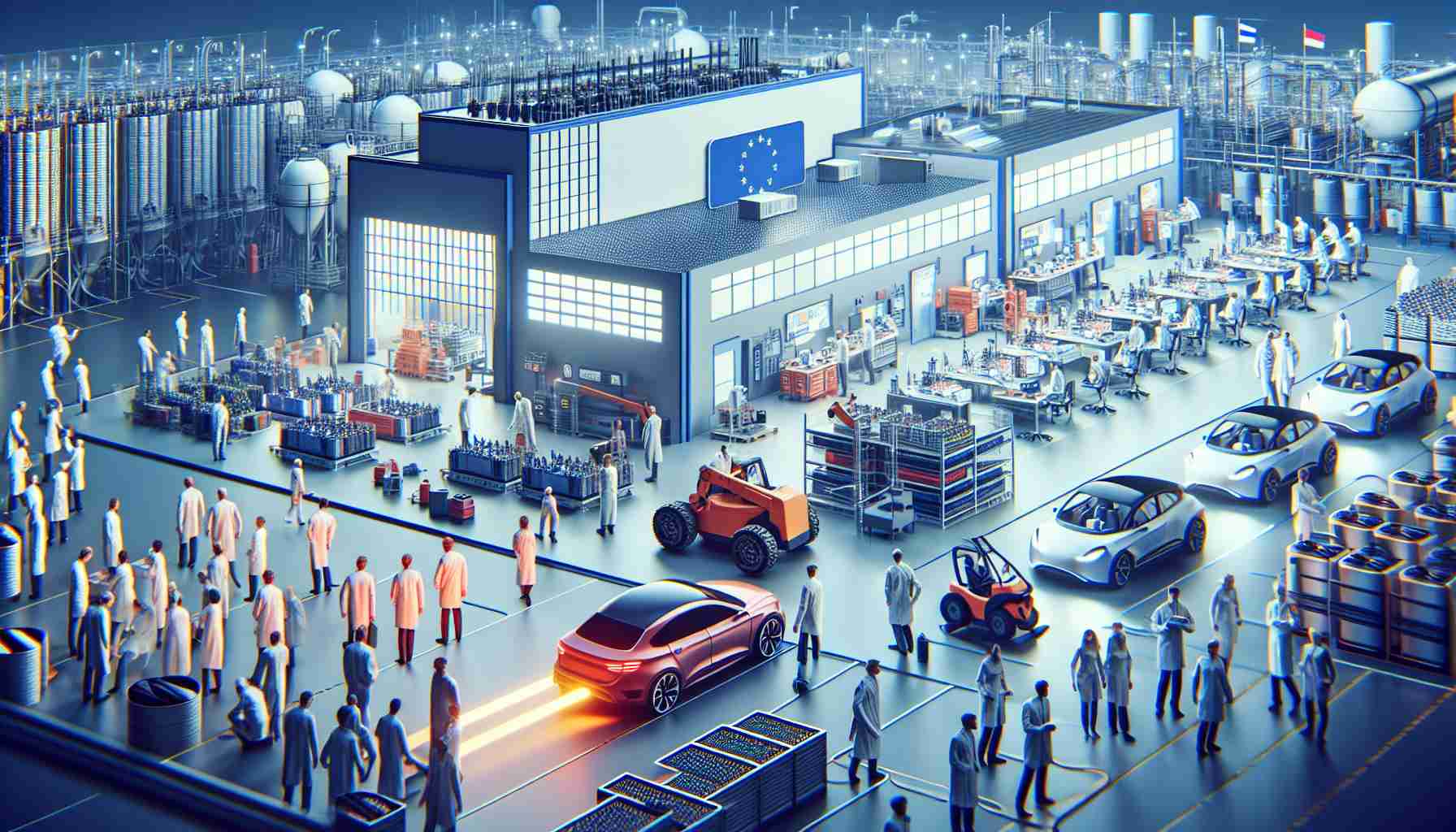- Europe’s EV battery market is rapidly evolving through strategic collaborations and investments.
- Slovakian startup InoBat is leading the charge for regional battery independence.
- InoBat secured a significant partnership with Chinese battery giant Gotion, facilitating gigafactory development in Europe.
- InoBat’s Series C funding round raised €100 million, increasing total capital to over €400 million, pivotal for scaling operations.
- Collaborations between European and Asian firms are enhancing technological expertise and financial strength in the battery sector.
- Despite challenges like economic uncertainties, European companies are resilient in the shift towards sustainable energy solutions.
The European electric vehicle (EV) battery market is experiencing a dynamic transformation, largely driven by innovative collaborations and strategic investments. In this evolving landscape, Slovakian startup InoBat is making waves, embodying the region’s aspirations for battery independence despite Northvolt’s recent financial struggles.
Led by the visionary CEO Marian Bocek, InoBat has bravely navigated a tricky funding environment. Last year, they forged a significant alliance with Gotion, a top Chinese battery manufacturer. This partnership not only resulted in Gotion acquiring a 25% stake in InoBat but also set the stage for the development of gigafactories across Europe. These factories aim to drastically enhance local production capabilities, reducing reliance on imports.
InoBat recently celebrated a key milestone: a remarkable €100 million ($104 million) in Series C funding. This boosts their total capital to over €400 million, heralding a new phase of growth and innovation in the fiercely competitive EV battery market. The influx of funds is vital for scaling operations and contributing to the regional shift towards sustainable energy solutions.
Europe’s battery sector is witnessing a notable trend of alliances between local and Asian companies. These partnerships are proven pathways to acquiring crucial technological expertise and financial support, illustrating the complex dynamics at play. As the industry continues its quest for more robust and sustainable battery technologies—such as the emergence of solid-state batteries—InoBat’s journey represents a hopeful, forward-looking narrative in this global energy revolution.
Facing challenges like economic uncertainties and high production costs, European firms remain resilient. With strategic partnerships lighting the way, the vision for a powerful, independent battery industry grows clearer by the day.
The Shockwave in Europe’s Battery Crusade: How InoBat Catalyzes the Market Revolution
The Current Landscape of the European EV Battery Market
In recent years, Europe’s electric vehicle (EV) battery market has witnessed rapid transformation, characterized by strategic partnerships and heavy investments despite economic uncertainties and fluctuating production costs. Notably, the landscape has seen prominent figures such as Slovakian startup InoBat, which is crafting a narrative of resilience and innovation. Under the leadership of CEO Marian Bocek, InoBat is striving towards battery independence amidst Northvolt’s financial hiccups, largely buoyed by collaborations with Asian giants like Gotion.
Key Insights and Developments
– Strategic Partnerships and Market Trends: InoBat’s recent alliance with Gotion exemplifies a significant trend where European firms are joining forces with Asian companies to acquire advanced technological expertise while securing substantial financial backing. This collaboration led Gotion to acquire a 25% stake in InoBat, facilitating the creation of gigafactories that aim to bolster local production capabilities and reduce dependency on imports.
– Financial Developments and Market Forecasts: The notable €100 million ($104 million) Series C funding round, which raises InoBat’s total capital to over €400 million, signifies a pivotal milestone. This capital injection is crucial for scaling operations, propelling innovation, and contributing towards Europe’s quest for sustainable energy solutions. Analysts predict that with sustained investments and technological advancements, the European battery market could witness exponential growth, reaching promising new heights by the mid-2020s.
– Innovation and Technological Advancements: The industry is increasingly focusing on emerging battery technologies like solid-state batteries, which promise higher energy densities and better safety profiles compared to traditional lithium-ion batteries. This innovative frontier is vital as the demand for more robust and sustainable EV solutions continues to grow.
Exploring the Pros and Cons
Pros:
– Reduced Import Reliance: Increased local production reduces dependency on imports, enhancing supply chain resilience.
– Sustainability Push: Collaborations foster technological advancements, furthering the shift towards sustainable and environmentally friendly solutions.
– Economic Benefits: The creation of gigafactories and innovation hubs results in job creation and economic stimulation across various regions.
Cons:
– High Initial Costs: Establishing new production facilities and conducting extensive R&D demand significant upfront investments.
– Economic Uncertainties: Fluctuating economic conditions can pose challenges to sustained growth and development within the sector.
– Dependency on Partnerships: Over-reliance on alliances with foreign companies might lead to vulnerabilities if partnerships falter.
Key Questions and Answers
1. What factors are driving the rapid evolution of Europe’s EV battery market?
The primary factors include strategic collaborations with Asian companies for technological and financial leverage, significant investments in local production facilities, and the ongoing shift towards sustainable battery technologies. The concerted effort to reduce reliance on imports further fuels the growth dynamic.
2. How is innovation shaping the future of the EV battery market in Europe?
Innovations, particularly in developing solid-state batteries, are crucial. These technologies are poised to deliver higher efficiency, increased safety, and longer life spans, addressing consumer demands for better performance while contributing to a sustainable future.
3. What challenges do European battery companies face?
European companies grapple with high initial investment costs, economic uncertainties, and the complexities of maintaining productive partnerships. However, resilience and strategic planning are paving the way for overcoming these hurdles, aligning with the broader vision of energy independence.
To stay updated on the latest in the European EV battery market and innovations shaping the future, visit Electrive and Automotive World.












